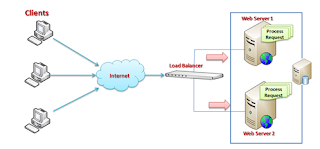Web Farm VS Web Garden
What is Web Farm?
You have only one web server and multiple clients requesting for the resources from the same server. But when there is huge numbers of incoming traffic for your web sites,one standalone server is not sufficient to process the request. You may need to use multiple server to host the application and divide the traffic among them. This is called "Web Farm".So when you are hosting your single web site on multiple web server over load balance called "Web Farm".Below diagram showing the over all representation of Web Farm.
In general web farm architecture,a single application is hosted on multiple IIS Server and those are connected with the VIP( Virtual IP ) with Load Balancer. Load Balancer IP’s exposed to external worlds to access. So whenever some request will come to server from clients, it will first hit the Load Balancer, then based on the traffic on each server LB distributed the request to corresponding web server.These web server may share same DB server or may be they can use replicated server in the back end.
Advantages of Web Farm:
What is Web Garden?
When a single Application pool contain multiple Worker process is called Web garden.In the below diagram you can see, one of the application containing the multiple worker process, which is now a web garden.
Advantages of Web Garden:
You have only one web server and multiple clients requesting for the resources from the same server. But when there is huge numbers of incoming traffic for your web sites,one standalone server is not sufficient to process the request. You may need to use multiple server to host the application and divide the traffic among them. This is called "Web Farm".So when you are hosting your single web site on multiple web server over load balance called "Web Farm".Below diagram showing the over all representation of Web Farm.
In general web farm architecture,a single application is hosted on multiple IIS Server and those are connected with the VIP( Virtual IP ) with Load Balancer. Load Balancer IP’s exposed to external worlds to access. So whenever some request will come to server from clients, it will first hit the Load Balancer, then based on the traffic on each server LB distributed the request to corresponding web server.These web server may share same DB server or may be they can use replicated server in the back end.
Advantages of Web Farm:
- Provides high performance response for client requests.
- Provides Better scalability of the web application and reduce the failure of application.
- Session and other resource can be stored in a centralized location to access by the all server.
- It provides high availability.If any of the server in the farm goes down, Load balancer can redirects the requests to other servers.
What is Web Garden?
When a single Application pool contain multiple Worker process is called Web garden.In the below diagram you can see, one of the application containing the multiple worker process, which is now a web garden.
Advantages of Web Garden:
- Web garden use processor affinity where application can swapped out based on preference and tag setting.
- provides better application availability by sharing request between multiple worker process.
- Less consumption of physical space for web garden configuration.












No comments: